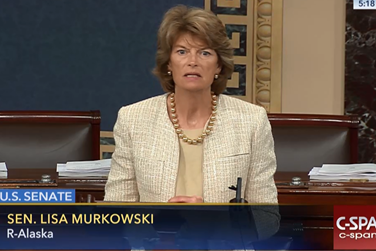Senate Passes Bill Providing Tools to Fight Opioid Addiction
Murkowski Votes for Legislation to Combat and Prevent Substance Abuse Through Education and Treatment
Today U.S. Senator Lisa Murkowski (R-AK) voted in favor of the final version of the Comprehensive Addiction and Recovery Act (CARA), to support community-based drug treatment programs and provide critical resources for those battling opioid addiction. CARA originally passed the Senate in March 2016 by a vote of 94-1, and went to conference committee to resolve the differences with the House version of the bill. Today’s bill passed by a vote of 92-2 and now heads to the President’s desk to be signed into law.
Prior to the final vote, Senator Murkowski spoke on the Senate floor to discuss the need in Alaska for the programs and resources supported by CARA, saying:
“The families, friends and communities that are working together to address opioid addiction need to know that they are not alone and that the situations that they face are not hopeless. We can provide that hope. We can provide the tools needed to build up communities so they can really come together to fight back against the addiction that we see. And I think that by moving forward passing CARA, we take the steps to do this. This legislation takes into consideration the diversity and the magnitude of the opioid epidemic. It works to address this issue head-on through improved research, pain management practices, community-focused programs and really opening up the dialogue about drug addiction. We know the more we allow ourselves to talk openly and honestly about this issue, the more that stigma fades. CARA is an encouraging first step. We all know that there is much more work to be done, and I certainly remain dedicated to the fight against substance abuse now and well into the future.”
(Click here to watch Senator Murkowski’s floor speech.)
Bill Highlights:
- Provides treatment of pregnant women and infants suffering from Neonatal Abstinence Syndrome.
- Supports youth and community recovery programs.
- Improves the reporting and understanding of addiction related to youth sports injuries.
- Establishes a Pain Management Task Force to evaluate current prescribing trends and support evidence-based decisions when prescribing opioid medications.
- Provides grants for areas that have experienced rapid opioid or heroin abuse increase and to the juvenile and criminal justice system to treat and prevent drug abuse.
- Supports veteran treatment programs and improves opioid prescribing safety measures within the VA System through education and training of pain management for providers.
- Aims to prevent overdose deaths through grants to improve access to Medically Assisted Treatment, overdose treatment, and first-responder training.
- Provides support for prescription drug monitoring programs.
The bill is supported by the National Council for Behavioral Health, a wide variety of psychiatric, law enforcement, and addiction treatment organizations, as well as the American Public Health Association and the National Association of Attorneys General.
The Alaska Department of Health and Social Services released a report in 2015 on the health impacts of heroin use in the state. The report found:
- The rates for inpatient hospitalizations for heroin poisoning have nearly doubled between 2008-2012.
- The number of patients admitted to substance abuse treatment increased from 58% to 74% for patients between 21-29.
- The number of heroin-related deaths more than tripled between 2008-2013, for a total of 72.
- Alaska ranks 20th in the nation for drug poisoning related deaths.
- Alaska’s number of heroin-related deaths is 42% higher than the U.S. overall.









